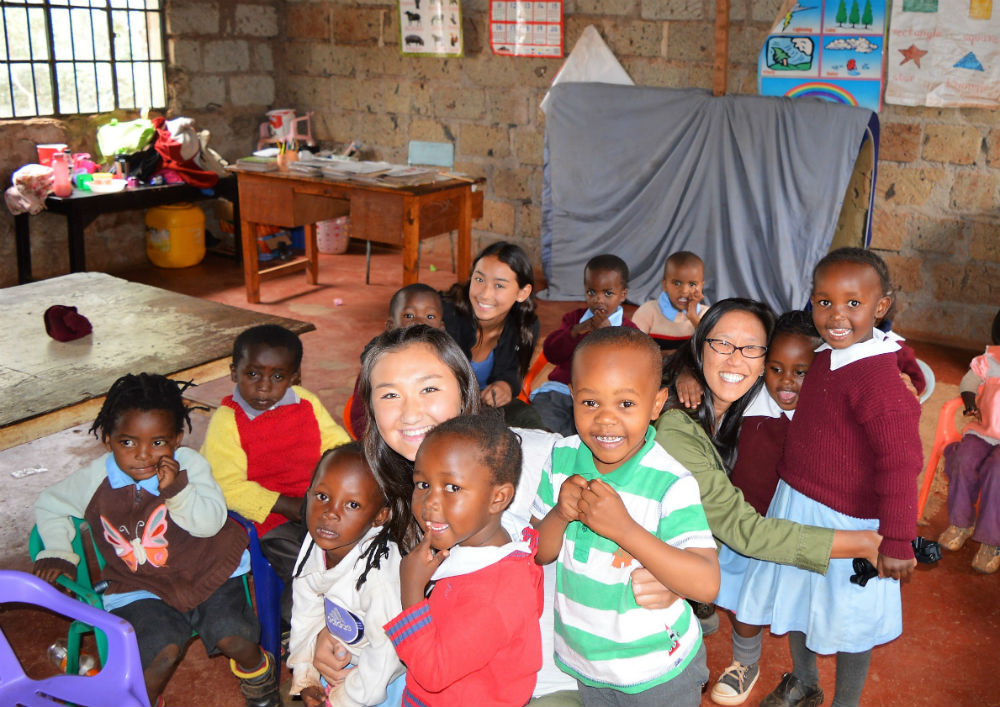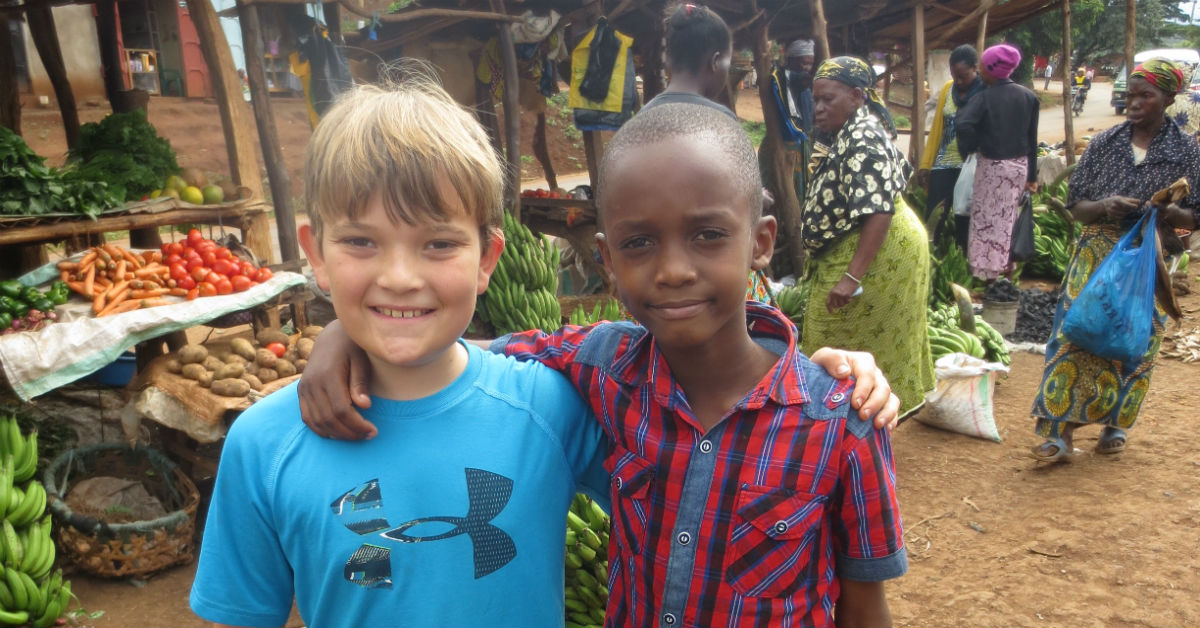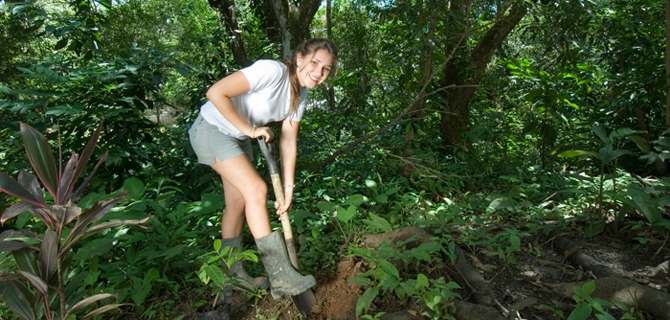Whether you’re a boomer grandparent or a gen-ex parent, you’ve noticed your kids aren’t like you. They seem somehow more…disconnected…less interested in the world around them, cynical, maybe even depressed.
Could it be all that time online? It seems uncontrollable. The best you’ve been able to do is ban smart phones at the dinner table, and even then they are sneaking peeks when they think you aren’t looking. Their center of gravity has shifted and you don’t know how to bring it away from digital connectivity to connection with real people, real issues, real places. Things that matter – or did matter – to you, at least!
Enter a fast growing trend: philanthropic family travel. Rather than treating kids to just another “fun” vacation, families are packing their values with them when they go abroad, and finding a way to make a difference at countless projects throughout the world. Whether it is an afternoon of community engagement at a nursery school, or a few days of volunteering at a leadership center for local youth, or assisting a mobile medical clinic, families are finding new ways to participate in local culture when they travel, bond with each other, and introduce their kids to the value of giving back—even when they are “on vacation”.
“We’ve now found a new way of traveling that is an interesting mix of helping and indulging ourselves!”
For the Besner family, who have completed two recent trips that included service components, volunteering took them outside their comfort zone and was an important reminder to their family about what matters:
“We take a lot of family trips. It was my husband’s birthday and he wanted to do a community service trip that was still our style. Volunteering had never been a part of our previous travels, but we chose to travel to Belize and it was amazing! It was hardcore for us since we’d never done something like this before, but it felt good. After traveling to Kenya we’ve now found a new way of traveling that is an interesting mix of helping and indulging ourselves! We got to see how other people live outside of our own little bubble. It’s made us more appreciative and has reminded us of the unimportance of material elements. After our trips, we started making small changes at home like making sure to turn of the faucet immediately and taking shorter showers. We’re far more conscious about the amount of waste we create and about recycling too!”.
Stephanie Brownell was in the midst of a divorce when the idea of doing a service project and safari in Africa with her two young children and soon to be ex-husband suddenly seemed to be just what they needed:
“While there were many things in which we were not in agreement, Ali and I shared a love of nature, travel, and seeing the world. I felt immeasurable gratitude to Ali for agreeing to and supporting the trip; we showed up together to help our children “look up” and delve into other ways of being in the world. We settled into a camp that specializes in eco-safaris – a conservancy on 283,000 acres of protected land, managed by a partnership between the Maasai of the Kuku Ranch Group and an Italian ex-pat.
We’d brought donations for distribution to a school and clinic run by the conservancy, and arranged to volunteer at one of the schools. We planned to take a group of children on their first field trip, a visit to Tsavo West National Park, as part of the “Buy A Trip, Give A Trip” program that allows local children to experience the natural treasures of their own country.
I was determined to find a healthier relationship with my former spouse and a happier family for our kids. I reached to show them how wonder and beauty could be found in an unfamiliar world, and to restore their confidence in who they were and that their parents would work together for their benefit. I wanted them to understand that their family is different in some ways than it was, but it is strong, stronger even in new ways, and so are they.”
Generational Bonding
Many families travel and volunteer together to cement intergenerational bonds that can get lost in the shuffle of today’s fast-paced lifestyles.
The Hart family’s trip was a multigenerational trip, spearheaded by the grandmother for her daughter and granddaughter. They wanted to do something that would be part of the larger whole, to learn about local cultures and be connected to a project that was giving back to the local community. They decided on Peru as their preferred destination.
The family participated in two different projects, one that prioritizes education for girls that come from economically impoverished, traditional Andean villages. The family contributed to the school’s lunch program by purchasing ingredients for their daily meals as well as playing educational games with the girls.
They also worked on a project focused on agriculture and greenhouse vegetable production as a means to improve local diets in the higher altitude villages where variety is sparse.
Maia, aged 10, captured the benefits of the trip this way:
“Peru helped me to become a better global citizen… the people were so kind and so thoughtful to everybody. Even people from different countries…. We did so many things that were team efforts. Over dinner we would say what our favorite part of the day was and we learned how we were the same and different as a family.”
What kind of service project is appropriate?
Finding an appropriate service project for a family with different aged kids can be a challenge. You don’t want anything too grueling for under-12’s. The point is to introduce them to another culture and community and peers who live very differently. For young ones, playing games, gardening, working side by side with youth in other countries is a splendid introduction to caring about other people’s lives, mixing friendship and compassion.
For teenagers, having a specific project to work on that they can see tangible results from during their service days can build confidence and give them a real sense of accomplishment. Peer to peer exchanges remind teens that despite cultural differences, they have shared hopes and dreams with their counterparts around the world.
College aged children may like to plug into more vocational experiences, such as volunteering at a veterinary clinic for a few days, tracking wildlife or even providing mentoring and writing support for high school age kids applying for colleges. Trips that include volunteering are a good testing ground for college bound kids, who might choose to volunteer on a sea turtle conservation project to grasp the realities of marine biology or the conservation sciences. Those long days spent under the sun collecting data about animals’ feeding habits or simply measuring or planting trees are a useful way to test their interests and support a good cause at the same time.
Coming Home
Once returned home, what do families take away from their experiences overseas? Are there any lasting outcomes?
Being exposed to communities with radically different resources usually leaves a strong impression on every member of the family. Maia Hart (10) said that before her trip, she was feeling down about school and wasn’t enjoying it. According to Maia, volunteering in Peru at a local school for underserved girls was “awesome” and made her realize that she is “lucky even to be in school”. Volunteering abroad is a great way for young people who have lived relatively privileged lives to become cognizant of this and begin to appreciate how they fit into the world, while taking a hard look at the importance their own culture places on material goods.
“This experience was special not because I felt good about making an impact on their lives for a short time but because of the impact they had on me.”
Like many others, 16 year old Gabrielle Nagy felt that she received more than she gave during her community interactions in South Africa:
“The important concept of appreciating the smaller things in life is often overlooked by many but is arguably the most humbling and special trait a person may possess. This experience throughout our trip made it possible for me to witness the culture and people of South Africa, but allowed them to leave a greater impact on me then we had on them.”
Families often come home with renewed enthusiasm for their own family bonds and togetherness and an appreciation for experiences that stretched their physical, mental, emotional comfort zones. They usually call out the volunteer component of their trip as their favorite part– in contrast to the more luxurious elements of their holiday. For parents, working up close with their kids can satisfy the longing for connection and intimacy that can be so elusive during heavily scheduled lives at home. “It’s the first time in ten years we’ve been together without cell phones,” said one Mom who traveled to Cuba with her brood. “It was fantastic!”





